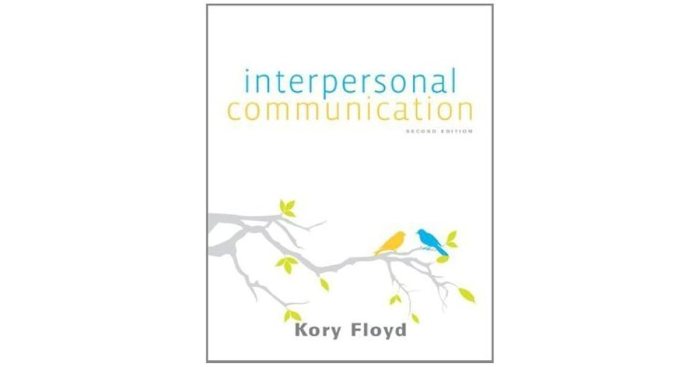Interpersonal communication kory floyd 4th edition pdf – Interpersonal Communication: A Comprehensive Guide by Kory Floyd (4th Edition) offers an in-depth exploration of the key concepts, principles, and skills essential for effective interpersonal communication. With a focus on real-world applications and case studies, this authoritative text provides a comprehensive overview of the field, empowering readers to navigate the complexities of human interaction.
Floyd’s approach emphasizes the importance of communication competencies, cultural influences, and conflict resolution strategies. The book’s well-structured organization and engaging writing style make it an invaluable resource for students, practitioners, and anyone seeking to enhance their communication abilities.
Interpersonal Communication by Kory Floyd 4th Edition: Overview
Kory Floyd’s “Interpersonal Communication” 4th edition is a comprehensive guide to the field of interpersonal communication. The book presents a balanced and up-to-date overview of the key concepts, principles, and theories that shape our understanding of how people communicate with each other.
Floyd’s approach is grounded in the belief that interpersonal communication is a complex and dynamic process that is influenced by a wide range of factors, including our personal experiences, cultural backgrounds, and the social context in which we live. He emphasizes the importance of developing strong communication skills in order to build and maintain healthy relationships, resolve conflict, and achieve personal and professional goals.
The book is organized into eight chapters, each of which covers a different aspect of interpersonal communication. The chapters are:
- Chapter 1: Introduction to Interpersonal Communication
- Chapter 2: Communication Competencies and Skills
- Chapter 3: Communication Contexts and Relationships
- Chapter 4: Communication Styles and Strategies
- Chapter 5: Communication Technology and Social Media
- Chapter 6: Communication Challenges and Conflict Resolution
- Chapter 7: Case Studies and Examples
- Chapter 8: Critical Analysis and Evaluation
Communication Competencies and Skills
One of the key themes of Floyd’s book is the importance of developing strong communication competencies and skills. He identifies five core competencies that are essential for effective interpersonal communication:
- Self-awareness: The ability to understand our own thoughts, feelings, and motivations.
- Empathy: The ability to understand and share the feelings of others.
- Communication skills: The ability to express our thoughts and feelings clearly and effectively.
- Listening skills: The ability to pay attention to and understand what others are saying.
- Conflict management skills: The ability to resolve conflict in a constructive and healthy way.
Floyd also discusses a range of specific communication skills that can help us to improve our interpersonal communication, such as active listening, nonverbal communication, and assertiveness.
Communication Contexts and Relationships
Floyd emphasizes the importance of understanding the different contexts in which interpersonal communication takes place. He identifies four primary communication contexts: family, friendships, romantic relationships, and workplace communication.
Each of these contexts has its own unique challenges and opportunities for interpersonal communication. For example, family communication is often characterized by high levels of intimacy and emotional closeness, while workplace communication is often more formal and task-oriented.
Floyd also discusses the role of culture, gender, and other factors in shaping communication patterns. He argues that our cultural background and gender identity can have a significant impact on the way we communicate with others.
Communication Styles and Strategies
Floyd identifies four primary communication styles: passive, aggressive, assertive, and manipulative. He discusses the advantages and disadvantages of each style and provides guidance on how to adapt our communication style to different situations and audiences.
Floyd also discusses a range of communication strategies that can be used to achieve specific goals. For example, he discusses the use of humor, self-disclosure, and persuasion.
Communication Technology and Social Media
Floyd discusses the impact of communication technology and social media on interpersonal communication. He argues that technology can both enhance and hinder our ability to communicate with others.
On the one hand, technology can make it easier for us to stay connected with friends and family who live far away. It can also provide us with new opportunities to meet people and build relationships.
On the other hand, technology can also lead to misunderstandings and conflict. For example, it can be difficult to convey tone and emotion in a text message or email. Additionally, social media can create a sense of isolation and loneliness if we spend too much time on it.
Floyd provides insights into the ethical considerations and best practices for using technology in interpersonal relationships.
Communication Challenges and Conflict Resolution: Interpersonal Communication Kory Floyd 4th Edition Pdf
Floyd identifies a number of common challenges to effective interpersonal communication, such as communication anxiety, cultural differences, and conflict.
He provides strategies and techniques for resolving conflict and improving communication in challenging situations. He emphasizes the importance of empathy, active listening, and constructive feedback.
Case Studies and Examples

Floyd includes a number of case studies and examples throughout the book to illustrate the concepts and principles of interpersonal communication. These cases provide a valuable opportunity to see how the concepts discussed in the book can be applied to real-world situations.
Critical Analysis and Evaluation

Floyd concludes the book with a critical analysis and evaluation of his approach to interpersonal communication. He compares and contrasts his approach with other perspectives on interpersonal communication and discusses the potential applications and implications of his findings for research, practice, and everyday life.
FAQ Insights
What are the key communication competencies covered in the book?
The book identifies and elaborates on various communication competencies, including active listening, empathy, nonverbal communication, assertiveness, and conflict management.
How does the book address the impact of culture on communication?
Floyd emphasizes the role of culture in shaping communication patterns and provides insights into how cultural differences can influence interpersonal interactions.
What strategies does the book offer for resolving conflict in interpersonal relationships?
The book provides practical strategies for resolving conflict, such as active listening, empathy, compromise, and mediation.